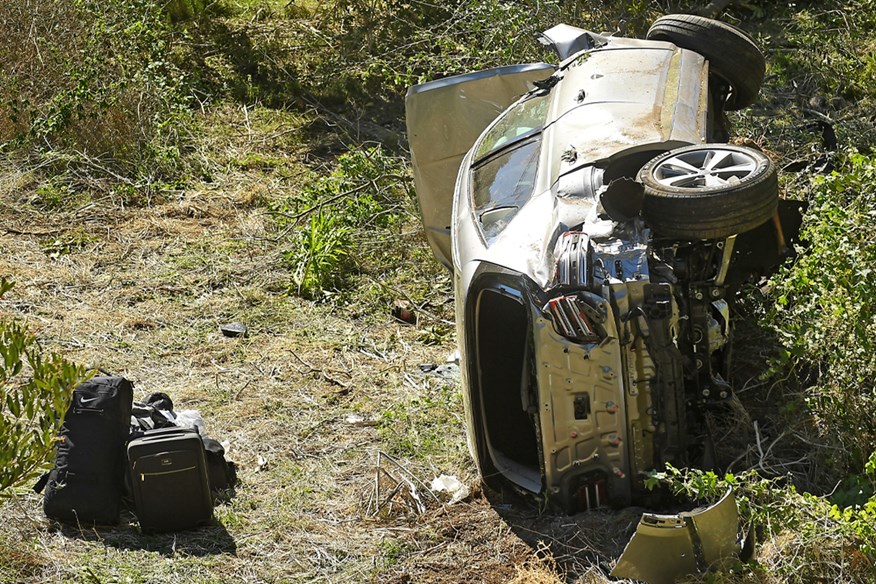EXCLUSIVE: Shipnuck questions whether Tiger Woods’ car crash was an accident
Last updated:
In an explosive and exclusive interview about his new book, LIV and Let Die, author Alan Shipnuck talks about Tiger Woods’ car crash, the future of tour golf, player greed, beef with Justin Thomas, and much more.
When Alan Shipnuck filed the final copy of his latest book, LIV And Let Die, on June 5, he was a relieved man. He’d managed to turn around the comprehensive story of the war between the Saudi Arabian-backed LIV Golf and the PGA Tour in just a matter of months.
The renowned sportswriter headed out for a day of relaxation at the spa, followed by a celebratory family meal and the first early night he’d enjoyed since typing the opening words of his new book.
But at 5am on June 6 he was awoken by an incessant stream of email alerts pinging from his laptop. Bleary-eyed he read a couple of the messages, which jolted him awake and had him scrambling for the television remote. As the screen came alive, he was greeted by the sight of PGA Tour commissioner Jay Monahan sitting alongside Yasir Al-Rumayyan, the governor of Saudi Arabia’s Public Investment Fund, which bankrolls LIV Golf, announcing plans to merge golf’s tours.
“There were these mortal enemies, sitting elbow-to-elbow on television announcing this bombshell. It was so weird, so disorientating,” Shipnuck tells us during a fascinating Zoom call. “This wasn’t a potential news break or something we knew might happen; it was done. And this was the first we’d heard of it. It was an incredible turn of events.”
In the following weeks, the bestselling author added almost 15,000 words to the back of the book before carrying out substantial edits to his original manuscript.
From Greg Norman’s previous disastrous attempts at creating a world tour (note the great white shark fin in the lake of the book’s excellent cover graphic) and the failed Premier Golf League, to the controversial history of Saudi Arabia and the bitter feud between some of golf’s biggest names, the book leaves no stone unturned in explaining how men’s professional golf reached this unthinkable stage and outlines the only possible solutions to end the conflict.

LIV And Let Die is Shipnuck’s ninth book and follows the award-winning journalist’s 2022 offering – Phil: The Rip-Roaring (and Unauthorised Biography) of Golf’s Most Colourful Superstar. That book sent shockwaves through the golfing world with the six-time Major champion branding Saudi Arabians “scary mother*ckers” and claiming he was using them as leverage against the PGA Tour. It played a pivotal role in Mickelson’s suspension from the Tour and, ironically, almost put an end to LIV Golf before it had begun.
In a wide-ranging interview, Shipnuck dives into his relationships with Mickelson, Norman, Justin Thomas, and the Saudis, reveals who he thinks the winners and losers of this conflict have been, raises questions over Tiger Woods’ near-fatal car crash, and reveals how people feared for his safety while producing this book.
It’s easy to laugh about it now but describe your feelings on the morning of June 6…
(Laughs) Like crazy whiplash! But it worked out great. It was already a huge story and it just got even bigger. Things had already crossed over from the sports pages to the business pages, but that put it on the front page and there’s just been an inescapable amount of interest around it, which all benefits the book. There was a little bit of human cost to me and my sanity, but that’s ok!
Better that it happened then than a few weeks later, though, right?
Oh, yeah. In the end, I’m happy it happened because if the framework agreement had come down when the book had already hit the printers it would have been devastating because there’d have been this gaping hole in the story. To Simon & Schuster’s (publishers) credit they let me take it down to the wire to get it updated. I’ve got friends who’ve already turned in books that won’t be out until next Summer – an eight to 12-month lead time is totally normal in the business – but I was still working on this manuscript in August and it was out in October. In fact, I got my copies in September. It’s an unheard-of turnaround time but it means it’s about as up to the minute as it could be.
Am I right in thinking that what we’re left with is only three possible outcomes? Full merger, partial merger with additional investors in the PGA Tour, or total collapse and the rivalry continues?
Absolutely, and I cover all the different scenarios in the last chapter, so I think I’m covered come what may, but this story is always changing and evolving.
You never would have imagined what’s happening in Israel and Gaza could have any effect on professional golf, it just doesn’t track, but after the first wave of attacks the PGA Tour put out an affirmation of support for Israel. Then a few days later Mohammed Bin Salman who, on some level, is the patriarch of LIV Golf, puts out a statement affirming his support for Palestine. It just throws into sharp focus that these two organizations are very different. The PIF and the PGA Tour have different backgrounds, different world views and different values but they’re trying to merge and synthesize, and this adds a little extra pressure.
This deal is already under heavy scrutiny by the US Congress and lawmakers and now it’s fair to ask the ‘are these the guys who are going to come in as your partners and essentially control this American institution?’. It just makes it that much more complicated. Who knows what’s around the bend in this story, but I’m looking forward to seeing it play out over the next six months or so.
What outcome do you want, both personally and professionally?
I only care about the professional and in that scenario, I’m always rooting for chaos (laughs). It’s going to be interesting whatever way it goes. If the whole thing blows up and LIV and the PGA Tour go back to being fierce competitors and mortal enemies, then that’ll be fascinating. If they can consummate this merger with the Saudis’ involvement and possibly reshape professional golf and create a global unified schedule with the best PGA Tour and DP World Tour events and a handful of LIV events, that could be super cool.
However it shakes out, it’s going to be a continued gift from the content gods. For those of us in this business, golf is a boring, staid sport, right? I went back and looked at the biggest golf stories in 2021 – the last season that wasn’t impacted by LIV Golf. Yes, there were rumors and rumblings, but it was largely just chatter at that stage. I Googled ‘What were the biggest golf stories of 2021?’ and one of the top results was the USGA reducing the maximum length of drivers from 48 to 46 inches. People were up in arms and it was a huge story in golf, which shows how boring it normally is!
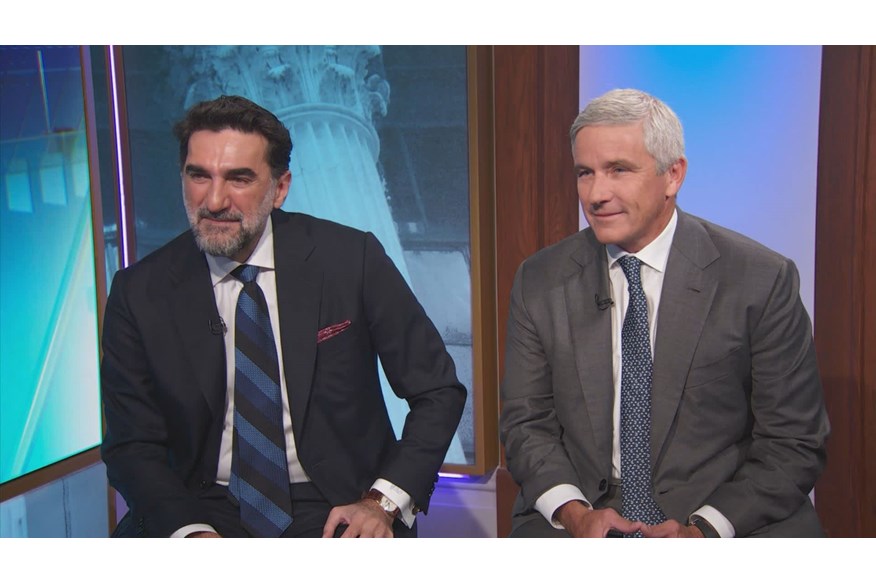
But if the deal does collapse, can LIV continue? The Saudis must want an ROI on the huge sums they’ve put in, or are they happy to just use it to sportswash if it increases GDP?
I think they want both. The Saudis have grown the PIF into this massive fund because they make good investments, and they expect a return on them. This narrative that they just burn money recklessly doesn’t track with their record as investors, so they’ll want a return. But other things are going on here that benefit the Saudis reputationally and are helping them break into new markets, so I think they’ll be happy and willing to play the long game. Even as they’re waiting to get their money back, which in the case of LIV would be by selling the franchises, consummating the framework agreement, bringing in TV money, or other revenue streams, they’re enjoying the sportwashing benefits, they are breaking into new markets, and they are part of this global conversation.
The PIF isn’t going away – it’s accelerating. That’s why there’s so much scrutiny on this so-called merger from the US Government. There’s a quote from Senator Chris Murphy in the book where he says this is a watershed moment for a foreign monarchy to come into control of an American institution like the PGA Tour because this sets a precedent. If this framework agreement goes through it creates a beachhead in US sports and then the next step is the Saudis want to buy the Dallas Cowboys, New York Knicks or the Boston Red Sox and that’ll be a big deal in the sporting landscape of the United States. It’s clear they have grand ambitions and sports is a good investment. You look at what the franchises sell for over here. This guy Dan Snyder buys the Washington Red Skins, now the Washington Commanders, for $400m, and for 20 years they’re terrible and everyone hates him, but he turns around and sells it in scandal for more than $2bn, so it’s a good investment because the money just keeps going up in sport and it comes with all these reputational benefits, not to mention the glory, fame and goodwill.
When the PIF took control of Newcastle United there were protests and banners and, I’m no expert in European football, but looking now it seems there’s been quite a turnaround and their fans are quite happy.
And at some stage, you just have to reach acceptance.
Yeah, I mean if you look at Rory’s evolution through all of this, he’s gone from a fierce critic of LIV Golf and by extension its benefactors, to becoming resigned to it and saying, ‘you can’t stop this, it’s part of sport, let’s see if we can help guide them.’ Rory’s evolution in one year is really telling and it’s the corrosive power of money.
Not just sports, that money is in all industries now, so it’s tough to maintain a stance.
Exactly. I did a talk at a private club in Silicon Valley and it got super-heated. This old guy was yelling at me “it’s blood money.” I was like ‘Sir, I don’t work for the Public Investment Fund, I’m not on either side here, we’re just kicking around the issues’. But then I asked who in the room drives a Tesla and every hand went up. Now the PIF owns a big chunk of Tesla, so it’s fine to condemn them and LIV Golf for taking that money, but you should probably sell your car, and it went a little quiet. If you’re going to take a strong, principled stand against LIV Golf then that’s great and I salute you, but you must live it in every aspect of your life and that’s hard because the Saudi money is everywhere.
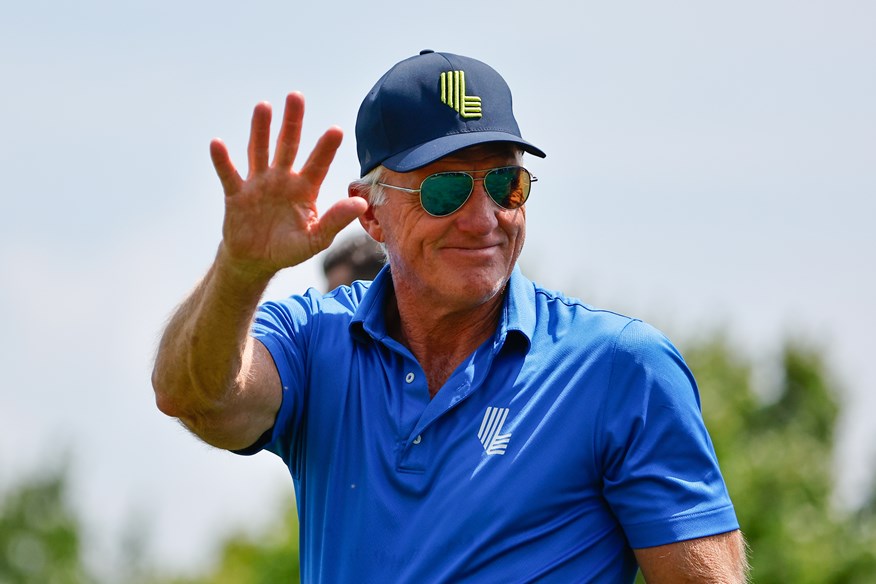
Greg Norman understandably gets a lot of focus in the book. What has been the impact of having him at the helm – could it all have played out differently with someone else in charge?
Greg was such an incendiary choice. I wonder if the Saudis as newcomers to the global game even recognised how controversial and how much of a pariah Greg is.
There’s a great quote in the book from Dean Beman, the old PGA Tour commissioner, who said ‘Making Greg Norman the head of LIV Golf was a declaration of war’. It was a signal that LIV didn’t want to play nice, and it was going to be this adversarial relationship. Norman is a muckraker with a unique ability to put his foot in his mouth and he just kept turning up the volume on everything. For people who didn’t like Greg Norman, they automatically didn’t like LIV Golf. A lot of people in the game dismissed LIV because of his presence, which was certainly to the detriment of the league.
If Norman’s friend and contemporary Nick Price had taken the job instead – a mild-mannered player who everybody likes – then the whole tone would have been different. He’s a global player with a great resume and he’d have been a great choice. But, to Norman’s credit, he’s had this vision for a long time, and it almost validates the idea. He has been this missionary to make the game more global for decades and there’s a purity to that vision, he’s always had it. He can say “Look I was pushing for this back when Rupert Murdoch was going to put the money in”. No one else believed in the vision, these guys have, so it gives him some credibility and some cover in many ways. He can turn around and refute accusations of sportswashing because he can say it’s a vision he’s had for 30 years.
He was an interesting, polarizing choice, no question. He gave LIV a lot of buzz because he’s a big name, a big star, and a big voice, and his force of personality and missionary belief played a big part in launching it, so it wasn’t all negatives – he brought a lot to the table – but it certainly affected the discourse.
Is his role even relevant anymore or, for all the talk of this being Norman’s revenge mission for past failed attempts to create big-money world tours, has he just become another pawn?
It’s right there in the black and white of that Senate appendix. It tells you how ruthless Yasir is. Norman was his No.1 guy, they’re buddies, but when it came to the chance to solidify his relationship with the PGA Tour and DP World Tour, Yasir was happy to move Norman out into this consultant role. It’s spelled out right there in the documents. Things can change and, as we’ve seen, the framework agreement, is just the beginning of the negotiations not the end, so Norman’s role is undetermined officially, but it looks like, if it goes through as constructed and Jay Monahan is the CEO of all golf then it’s going to impact Norman’s future.
But it almost doesn’t matter. He can declare victory no matter what. He’ll say he did what he wanted to, he changed golf, he made it more global, he changed the marketplace where the players finally got their true worth and gave them governance – all the things he was advocating for behind the scenes as a player. And I’ve been told he has a golden parachute payment, so Greg will be fine either way.
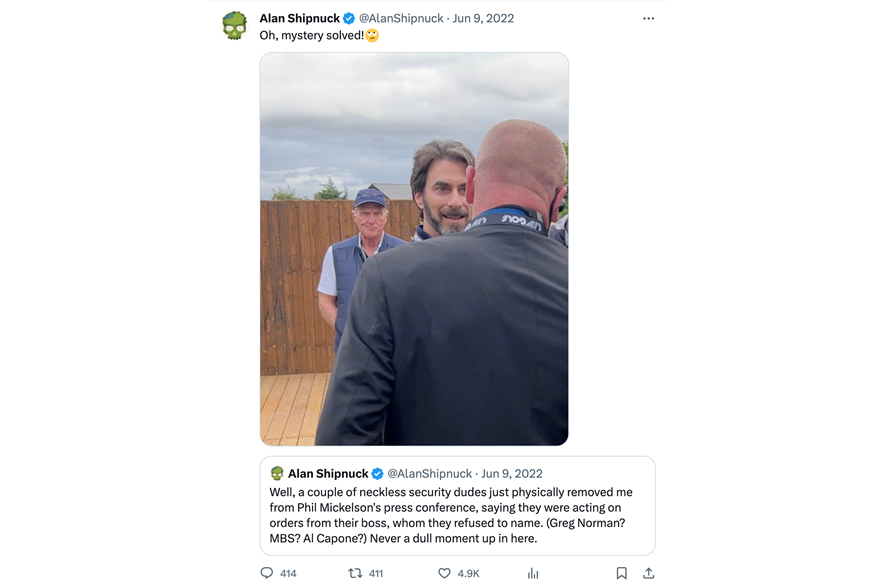
How’s your relationship with him since that infamous photo at Centurion (Norman claimed to have no idea that Shipnuck had been denied Media Centre access at LIV’s inaugural event, but was pictured looking on as the journalist was blocked by security)?
I found him at the next LIV tournament in Portland, ran over to him in the parking lot and was like “Greg, what the hell?”. We had a meeting of minds and to his credit he apologized for everything that happened in London. It was a conciliatory conversation and he said he would sit for interviews for the book because he wanted everything to be told, and that he’d give me access to the boxes of documents he had going back to the 1990s showing the Tour’s malfeasance, but he reneged on that, never let me see the documents, never sat for an interview. He’s been cordial to me since London when I see him around, but he always has this panicked look in his eye. I’m sure his bosses kiboshed the interview because Greg has rarely run from a microphone. That was disappointing.
But the relationship’s fine – I’ll text him occasionally to fact-check something and he responds. The lines of communication are open, it was just a shame not to get that interview.
Does working on a story and project like this bring any fear? I mean, you quoted Phil as calling the Saudis “scary motherfuckers” in your last project, so does it ever cross your mind that you don’t want to piss these guys off?
(Laughs) I never had any concerns for my personal safety, but other people had those concerns and I’ve had that comment a lot. It is wild to even have to consider that or that it’s even a possibility – I’m just writing about golf – but a lot of people don’t realize what’s already out there in the public domain so were worried about some of the things I was saying.
What sort of things?
Chapter five in LIV and Let Die goes into the entire history of Saudi Arabia from the road to 9/11, the killing of Jamal Khasshoggi (the Saudi journalist and dissident who was assassinated in 2018), which was proceeded by the rise of MBS (Mohammed Bin Salman), and the complicated relationship with Donald Trump. For a lot of readers, they have no idea and this could seem like sensitive or inflammatory material, but it’s all in the public domain. I was never able to uncover anything that I think would damage the Crown Prince in a way that he already hasn’t been, so I was just an aggregator. I did a lot of interviews, read a lot of books, and talked to a lot of experts and synthesized that in an accessible way for people but there was no smoking gun in there. Since 2018 a lot of people have been criticising MBS so I’m just another voice in the chorus.
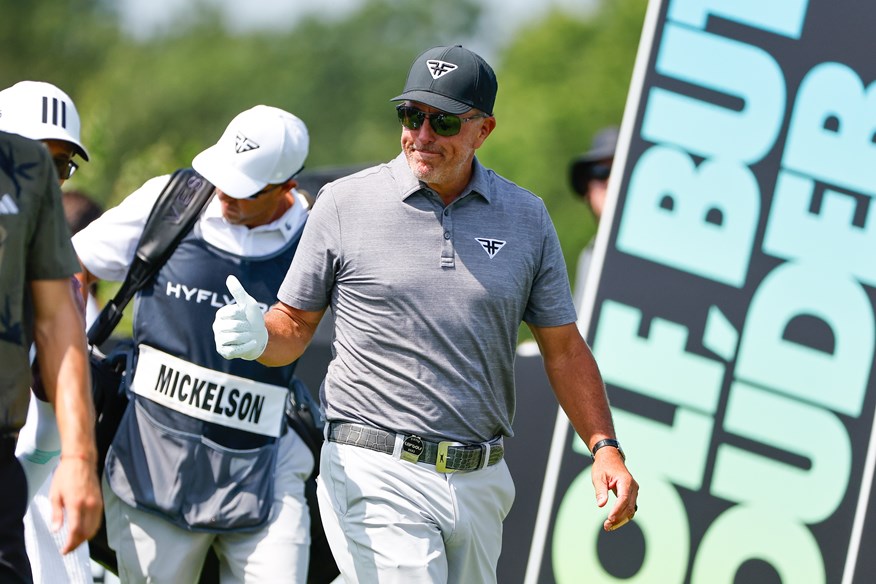
Based on his quotes last week, Phil seems cocksure that LIV is going to be welcoming a lot of big new players from the PGA Tour in 2024. Is it all bluster?
Phil’s a great salesman and it’s hard to know where the insight ends and the bullshitting begins. The line is always moving, day to day, topic to topic. But he’s very tapped in, and he’s been at the center of the maze of this entire story going back years. He understands better than anyone how we’ve got to this moment and he’s an influential guy at LIV.
There’s no question there’s a lot of negotiations going on right now between LIV and various PGA Tour players trying to woo them – it’s a real thing that’s happening and it’s an interesting moment because we don’t know what’s going to happen with the framework agreement. It’s supposed to expire on December 31 and it’s been made clear to me by people who are part of the process that there’s no way it’s going to be consummated by then and it’ll certainly get bumped into 2024, so players who are being wooed right now don’t really know what the future looks like but they also know this could be their last chance for that big payday.
It’s an interesting moment in time for players and if you’re a Patrick Cantlay or Rickie Fowler, who turned down $75m to join LIV the first time around, this might be the final opportunity to get that. But, if you sign up, you still don’t know exactly what you’re signing up for because the future of LIV remains so uncertain and in 2024 you’re not going to get world ranking points and could get shut out of a couple of Majors.
The biggest stars on LIV – Phil, Brooks, Bryson, DJ, Cam Smith – are into the Majors already because they’re still coasting on the exemptions from their own victories, so they’re good for ’24 and mostly for ’25 and even ’26, so the world ranking points don’t really matter to them. Maybe it hurts their pride to see they’re 200th in the world or whatever, but the only real value of OWGR is as a gatekeeping mechanism for the Majors. It’s that next tier of players, like Talor Gooch, who won three times this year and won their season-long points list, making him the best player on LIV Golf, and he declared himself one of the best players in the world after shooting 62 in the final round in Jeddah to clinch that $18m bonus, and he might be, but if he doesn’t play in the Majors we’re not going to know that.
Guys in that tier are good players but don’t have multi-year exemptions to the Majors, so joining LIV comes with a big risk. There will be player movement, but is it going to be B-list guys like we saw this year, when the biggest signing was Thomas Pieters, or is it going to be the blockbuster signings we saw in 2022 when Hall of Fame players, Major winners, and Ryder Cup stars were making the move? Rubber is going to hit the road here because guys are going to have to make that decision before the framework agreement is done.

Phil and the rest of those who took the big cheque have enjoyed vast financial benefits, but if we take away the money, have any LIV players truly benefited?
It’s hard to take away the money when Talor Gooch won over $36m this year on LIV. Money’s always been the measuring stick in golf and that used to be how they ranked the players. But winning is hard at any level of golf so for him to have won three times, he’s put a lot of good memories into his golfing brain and his career has been upgraded at LIV. He has a swagger now, he does believe he’s one of the best players in the world, and that’s a coat of armor that travels with you wherever you play.
Other than Gooch, Bryson DeChambeau’s got his career back on track, playing very well week-to-week on LIV, and he’s taken that into the Majors this year, contending at the US Open and the PGA Championship.
And even Brooks Koepka. Him contending and winning on LIV was an important building block he took into the Masters and the PGA Championship, which he won. Those three guys have definitely benefited from LIV, gaining confidence, sharpening their games and discovering or rediscovering the killer instinct required to win golf tournaments.
The question is, moving forward, can LIV keep them sharp? There’s no doubt the fields are much deeper on the PGA Tour and it’s harder to beat 155 other players over four rounds in this Darwinian environment where everyone is fighting for their livelihoods versus LIV Golf which has 48 players, half of whom are on scholarship if you will. It’s a lot easier to beat 20 guys over three rounds than 150 over four – everyone knows that. There’s not quite enough data yet to say definitively whether these guys, if they just stay in the closed environment of LIV, can continue to be competitive in the Majors. But the three I’ve mentioned have certainly been the main beneficiaries so far.
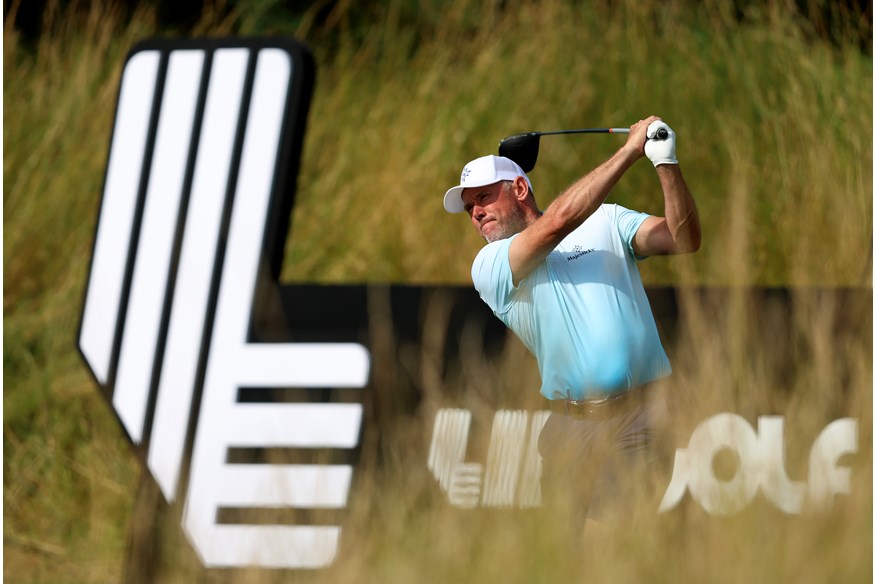
Does LIV somewhat shoot itself in the foot when it comes being taken seriously when players like Lee Westwood can have an awful season, finish in the relegation zone, but be protected by a contract or captaincy?
It’s semantics, too. If you win a PGA Tour tournament in October of 2023 then you’re exempt for 2024 and 2025. You might struggle in every event for those two years, but you still have a job. LIV’s argument is that Westwood has earned that exemption through his career in golf and his achievements – that it wasn’t a gift, it was earned by accomplishments. He essentially got a four-year exemption by way of his contract.
The difference on the PGA Tour is it is a meritocracy – you’ve earned it in the moment by winning a tournament, here and now, whereas LIV is granting exemptions based on things that might have happened five or ten years ago, so it feels a little different. It is a problem with LIV, this sense that guys have unlimited job security and therefore they don’t care. That said, I saw Lee Westwood hitting balls until sunset a few times this season, so he’s trying hard, and he hasn’t given up. The results haven’t been there, but the effort is.
The churn on LIV and the PGA Tour is comparable. I’d expect to see up to 12 new faces on LIV next season, which is 25%, and out of the 150-200 players on the PGA Tour, you never have more than 50 new players gaining status, so while the pool is larger and perhaps the PGA Tour players have earned status rather than being gifted it, the turnover is similar.
I’m really interested in a quote I heard from you in which you said that LIV has given Tiger a purpose. What do you mean by that?
After Tiger’s accident in February 2022, he was never going to be a week-in week-out competitive golfer again, that was very clear. The game has mostly been taken away from him. He may give us a few more thrills in his very limited cameos but he needed a new role for himself and within the sport. And in a weird way LIV Golf gave him that, because this battle for the soul of professional golf activated Tiger, energized him, and got him engaged in a way that he’s never been before.
Even when he was the best, most dominant player on the planet, he had no interest in Tour governance and never had an official position within the firmament, so for him to join the board of directors and fly into Delaware last summer to rally the troops and put himself on the line for something that isn’t going to benefit him – he’s not going to play these elevated tournaments – is selfless.
There’s an element of him protecting his revenue streams – he gets Player Impact Program money and the Tour are paying him indirectly through TGL – but he won’t enjoy this new golf landscape because he won’t play in these tournaments. He was doing it for the greater good and to protect his legacy. He’s very proud of his achievements, as he should be, and 82 Tour victories is the gold standard, which he shares with Sam Snead, but if the Tour withers and all the best players leave the value of a Tour victory is greatly diminished and Tiger doesn’t want his legacy diminished.
Taking up the fight has elevated Tiger’s standing and given him a lot of respect and credibility with the younger generation of players who he’s never been connected to because he’s just been hurt for so many years and hasn’t been a regular presence on Tour. It’s a big development in his life more than his career – this has brought Tiger back into the fold and given him a human connection that he really needed.
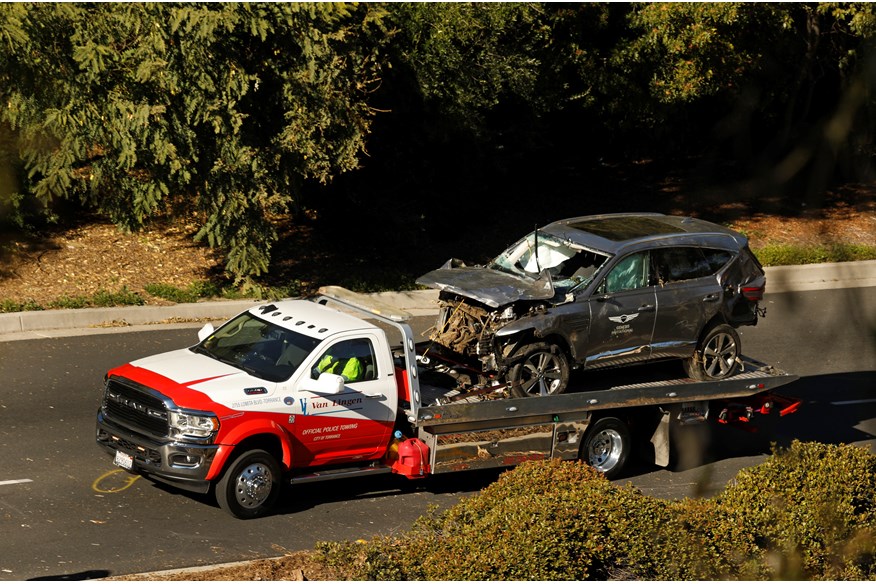
You’ve also questioned the details behind the car crash that almost killed him. Do you think it wasn’t an accident?
We know what happened, we just don’t know why. Tiger’s always dismissed any questions about that day by saying it’s all in the police report, and it is. He was on a residential street, speed limit 40mph, and he was going 88. The black box of the car reveals that the pedal was depressed at 99 per cent force throughout the accident – that just can’t happen if he fell asleep at the wheel, or he was momentarily distracted by his phone.
Something went wrong that day with Tiger and we don’t know exactly what – only he does – but it raises a lot of serious questions and for a guy who’s had addiction issues and been in some dark places, the events of that day are concerning.
During the long road back for him, human connection is something he missed and really needed, and he found it through this battle between the tours. We’ve watched the aftermath of the accident play out publicly and now Tiger has a different role in the game. It seems like the friendships and relationships he’s made over the past couple of years have become very meaningful to him.
It’s been delayed until 2025, but do you imagine Tiger and Rory would ever have created a concept like TGL if it wasn’t for LIV?
(Smiling) It’s interesting because TGL is a breakaway league that’s going to compete with the PGA Tour for viewers and sponsors, yet the PGA Tour is supporting TGL and is getting paid by the TGL. It’s a radical breakaway league with a team format and an emphasis on attracting younger fans… where have we heard that before?! It’s quite ironic.
It might have happened anyway, but it became a big thing for the PGA Tour because keeping Tiger and Rory in the fold was deeply important, so whatever they wanted they would get. Maybe the Tour would’ve pushed back in the past and questioned what they would get from it, but now they’re totally on board because not only does it keep the two most important guys happy and get them paid but it’s also a mechanism for buying the loyalty of all the other Tour players who are now signed up for this league and being paid to be part of it.
I don’t know if TGL will succeed on its merits and I’m personally not that excited about the product, but it has become an important part of this battle. The top players become veracious – they have to have the money – and this is another way of getting them the money.
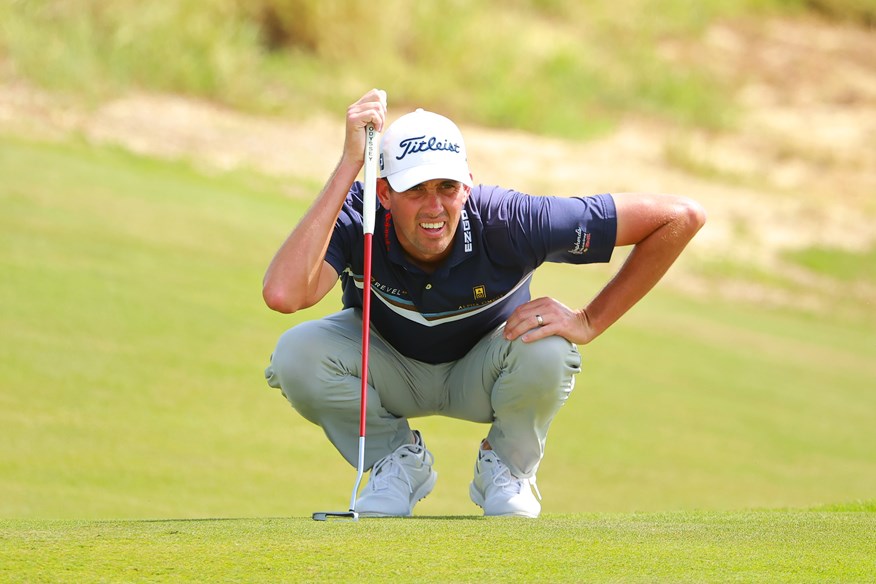
There was clearly greed in the game before but how much has the arrival of LIV and influx of Saudi money increased that among all of the players on all Tours? Is everyone now overvaluing themselves?
One of my favorite parts of this entire saga was when Chesson Hadley, who is just a PGA Tour journeyman, got up in front of a bunch of reporters and demanded to be paid for his loyalty to the PGA Tour. I was like ‘Chesson, no one cares one way or the other. You can go to LIV or not, no one is going to notice!’ But that sense of entitlement has gone from the top players all the way down to the bottom. It’s a chicken or the egg question because I’m not sure if it accentuated the greed or just brought it out into the open. It’s been on naked display, and it has inflated the golfers’ sense of their self-worth.
Golf was always a meritocracy – your income was always directly tied to your scores. Now it’s evolved into like team sports where there are contracts and guaranteed money regardless of performance. You see it in the Premier League, NFL – guys play well, they get a huge contract, and their performance always falls off because they lose the fire or get injured. For better and for worse golf is moving in that direction and the Tour’s embraced it.
Even the Player Impact Program is just a way to give golfers money that is not tied to their performance, same as TGL, and now there’s this $500,000 stipend that the players now get to cover their expenses. The Tour has moved away from meritocracy. Even when they’ve been saying that ‘LIV is an exhibition and we’re real hardcore golf,’ they’ve changed their model.
These elevated events in 2024 with guaranteed money and no cut shows the products are converging. Golf has finally realized that it needs to keep the top players happy no matter what and to do that requires a certainty over money – it can’t be tied to a guy making cuts or finishing high up a leaderboard. They need to buy the loyalty of these players because the whole landscape has changed. The players just want more and more because it’s available to them and that’s just human nature.
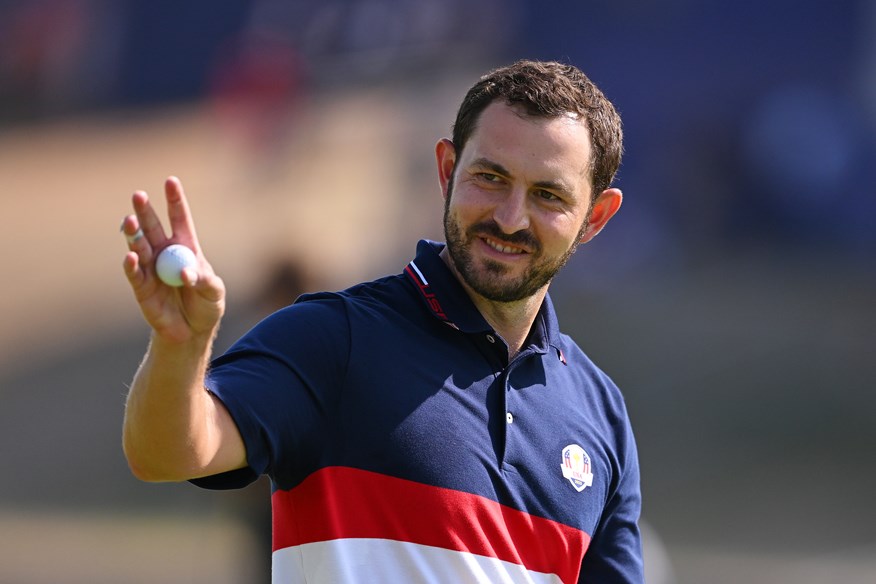
Is it inevitable then that players will expect to be paid to play in the Ryder Cup?
It’s a weird deal. I’ve been to a lot of Ryder Cups and everybody is making a tonne of money. The hotels are gauging you for $900 a night, the Ubers are tripling their prices, the vendors are making big money, the PGA of America and European Tour are making tens of millions, the captains are making money from endorsement deals and tournament invites they wouldn’t get otherwise. The only people not making money are the players, which, honestly, is a little weird, and it’s an anachronism.
I think the players will try as hard to win the Ryder Cup whether they’re paid or not. They put that uniform on and that’s where the passion comes from, but it’s like college football. The coach is on $10m, the university is making hundreds of millions, but the players are getting nothing. It feels exploitative and I think the Ryder Cup is pretty much in that territory now.
It wouldn’t be a big deal if they broke some money off the millions it makes to give to the players. I certainly wouldn’t have an issue with all 24 receiving a set amount, say a million dollars each, for being on the team. Some guys might play five matches and some might play two, but that’s sport. If a coach benches you then you still get paid and the guy who plays two might still be the one who seals the vital result.
There’s clearly more of an issue on the American side so the PGA of America are going to have to do something. Two decades ago, under pressure, they gave the players money for charity and that figure hasn’t changed – it was $200k then and it still is now, so it’s not exactly keeping up with inflation. It’s coming to a boil because the Ryder Cup money doesn’t even go to the PGA Tour, it goes to the PGA of America and the players only interface with that organization once every year at the PGA Championship, where the purse is the same as the other Majors. Perhaps if it was $50m and that was how they funnelled some of the money back to the players things would be different.
The European players are less bothered about being paid. Firstly, because they care more about the Ryder Cup, that’s just a fact. Secondly, they understand that without the Ryder Cup, the European Tour goes out of business. It floats the Tour for two years and the money effectively goes back to the players.
People were annoyed that unnamed sources were used to break the story of Patrick Cantlay wanting to be paid to play the Ryder Cup, and that’s something you’ve been criticized for with the new book, with plenty of people quoted under the cover of anonymity. Is that just part of modern media that allows you to tell stories that would otherwise go unwritten?
(Laughing) First of all, I was worried for the future of journalism until I realized everyone on Twitter is a journalism professor. We’ve got hundreds of thousands of experts in the field, apparently, so the future is bright!
I don’t know if these people read the New York Times or the Washington Post and they see stories about what’s happening in the defense industry or the White House, but anonymous sources are often the only way they can get these stories out.
It’s just naïve to think that people are always going to sacrifice their self-interests and put their name on it. I tried to keep it to a minimum and I was always pushing people to go on the record, but it just wasn’t possible at times. This whole thing was happening in the shadows, every contract and negotiation was done in secret, every time money moved around or there was a betrayal. There were no press conferences or press releases so to create the entirety of this saga I was relying on people that had been fired by LIV Golf and had NDAs who couldn’t speak openly. I was talking to people within LIV, within the PGA Tour and other powerful institutions who wanted me to know the story, but they were not at liberty to identify themselves. As the writer you just have to weigh the value of the information and it would’ve been really hard to write this book without using any of that information.
I’m at peace with it. It’s a valid critique and I understand readers want to know who’s saying what and I did everything I could to nudge people onto the record but sometimes it was impossible because the stakes were too high.
The people who I interviewed know who they are, there were caddies or agents or wives around who were privy to the conversations so there’s a trail out there. But it’s a leap of faith with the reader and I equate it with golf and when your buddy has hit one into the trees but then rockets one out because he says he had a great lie. You either believe him or you don’t. In some ways it’s a test of your own values system. The reader must go on a journey and trust the writer and I hope in my case that they do.
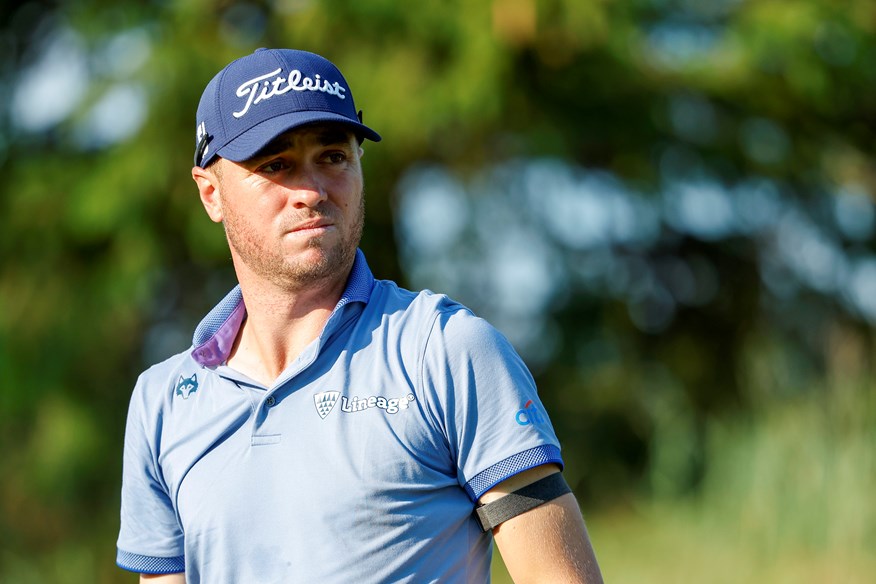
Justin Thomas criticized you and the book in a series of posts on X. Is there some historic beef between the two of you?
No, not really with Justin. He’s just kind of a snarky presence in general on social media. Players live in a bubble being told things by their paid enablers and in the context of this story they were spoon-fed a lot of stuff by Jay Monahan and Jimmy Dunne. A lot of my reporting counters that and they don’t like to be presented with a different version of reality, so they push back.
It’s also an issue of control. These guys want to control everything and to some degree they have control over the PGA Tour. If Justin Thomas were to be suspended, we wouldn’t even know about it because the Tour would protect him and not even make that public. He can exert control over some people in the media by cutting off their access or at least that perceived threat, but he knows he can’t control me, and I think that bothers him because I don’t really care if Justin Thomas wants to talk to me.
His Tweet said something like, ‘I’m sick of Alan Shipnuck making money and not telling more positive stories’. Justin Thomas is going to make more money finishing dead last at a no-cut elevated event that only exists because of LIV Golf than I’ll ever make on this book. These guys are so veracious, so greedy, and that anyone would get some money besides them just bothers them so deeply. I feel like his little statement said more about him than about me.
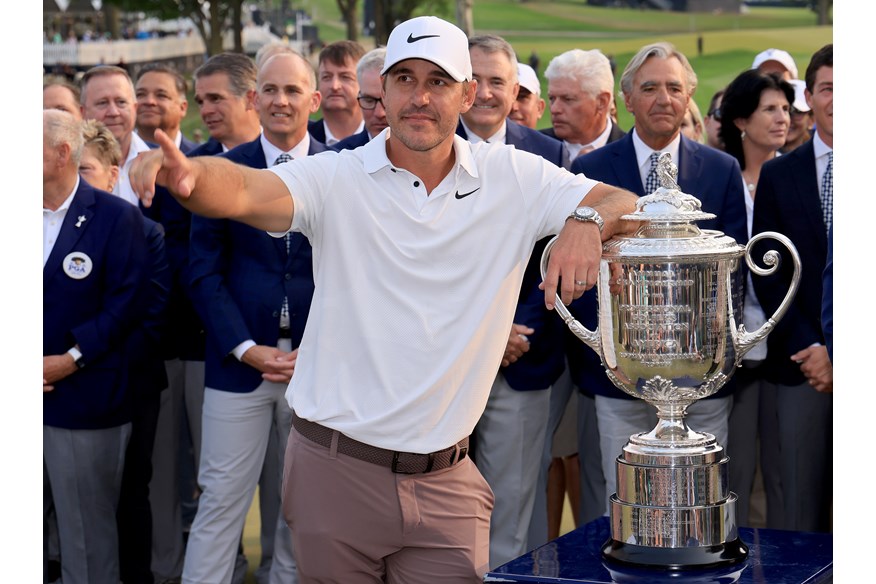
Brooks Koepka and his mum have both taken to social media to deny a quote in your book – namely Brooks saying “After signing that contract, the first person I called was my mom. We both cried”. Is that just to be expected?
That was weird. I’m not sure I ever imagined I’d have Brooks Koepka’s mum Tweeting about me. I spoke to Brooks’ agent who was there when he signed the contract and he said, ‘he didn’t call his mom that moment’. I was like, it doesn’t say that, but are you saying he didn’t call his mom at all? And he said he was sure he did. I think they read it the wrong way, like I was suggesting he was pen in hand, signing the contract, with the phone to his ear crying to his mom at the same time. It was almost like a semantics thing. I’m really not sure what they’re disputing because I know Brooks called his mom and talked about the contract.
We need to discuss PGA Tour boss Jay Monahan. Are you surprised that, not only is he still in a job, but that he’s arguably more powerful than ever?
He’s a very effective brawler behind the scenes and he’s never going to go quietly into the night. It’s his personality – he wants to try and fix this problem he’s created.
On a very fundamental level the job of the commissioner is to get the players paid and Monahan has done a spectacular job of that. The guys on tour were playing for $8m a year ago and now they’re playing for $20m and $100m of PIP money has been handed out this year. He’s helped broker the TGL deal and he’s getting the top players paid in extravagant fashion so I’m not sure how mad any of them truly are with him.
Now he’s going to reshape the entire model of the Tour from this old-fashioned not-for-profit entity into a modern sports league that can take outside investment. Whether the Saudis put it in or it’s New York private equity or Silicon Valley or even Hollywood money, the Tour is going to tap into $2bn. That’s their benchmark of investment. It’s going to be better capitalized than it’s ever been at some point in 2024 so Monahan will have secured the long-term financial underpinnings of the Tour and instead of having to go back to the sponsors trying to squeeze another million or two out of them, they’re going to be sitting on this war chest they can use to pay the players and invest in the product.
He may yet salvage this entire situation but it will come at a great cost to his reputation, he’ll have put the Tour through two or three years of strife and run off some of the most popular and important players. Ultimately the guys who stayed will make more money than they ever dreamed of, and the long-term future of the Tour is going to be sounder. I think he’ll survive this because if he was going to be out, he’d be out already. He’s central to these negotiations to fix this situation so, if anything, he’s consolidated his power.
But if he’d just responded to the Saudis when they approached him two or three years ago, or at least discussed it with the Tour and the players, we could have avoided all of this, couldn’t we?
Yeah, absolutely. And now he’s negotiating with the guys he villainized, so it was a fatal miscalculation in the moment. I give him credit for eventually coming to the table because he could have stayed dug in, it’s not easy to publicly admit such a gigantic mistake and know you’re going to take so many bullets from so many people, but I guess that’s leadership.
People in the public spotlight very rarely admit a mistake or, if they do, it’s part of their goodbye press conference. It’s commendable that Monahan’s staying on the frontline, taking the bullets, and even though he put them there, he may lead them out of it. It’s an interesting case study in management.
Where does all this leave the DP World Tour. With the top ten players now all gaining their PGA Tour cards is it now little more than a feeder tour?
It’s certainly withered, at least since COVID arrived. I think this framework agreement could be a road back for the DP World Tour. If this deal gets consummated and the Saudis are part of it, the best-case scenario in my mind is that it creates a global unified schedule where you take maybe the dozen best PGA Tour events, five or six of the best European Tour events, a couple of the LIV events, and all the top players are compelled to play in them. It moves around the globe and the golf calendar in a way that makes sense instead of the tournaments competing against each other.
We could just call them all elevated events and make Wentworth (BMW PGA), the Irish Open, Scottish Open, Australian Open part of that, with all the best players competing. It would have this sense that we’re supporting global golf, supporting these grand old tournaments and courses.
The European Tour is part of this agreement so that $2bn of investment is also going to benefit it. It’s been scrambling for years to try and secure its financial underpinning so I think the Tour is going to come out of this in a stronger position, where it’s better capitalized and there may be avenues to entice the best players to show up more often. It’s been a tough few years, but I think the future is definitely brighter for the European Tour – how that looks will just depend heavily on how the agreement gets finalized.
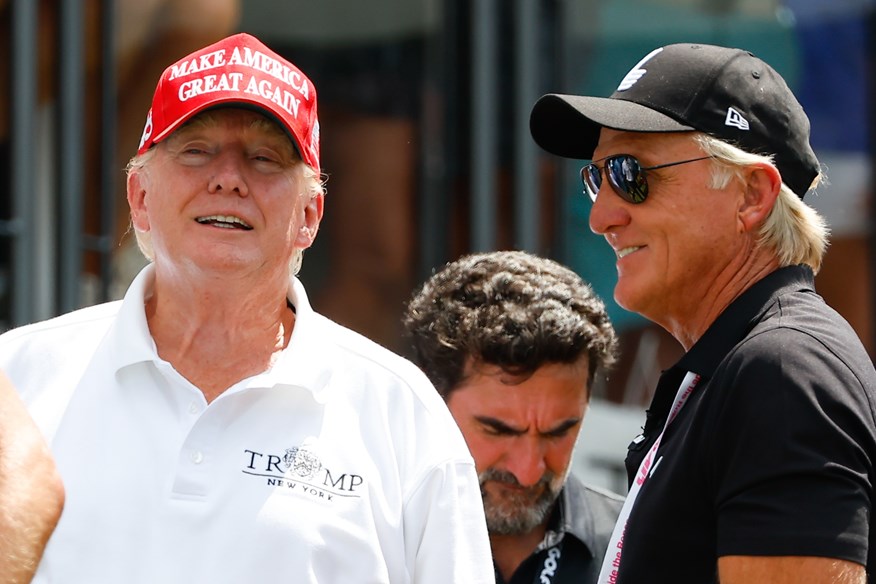
Let’s talk Donald Trump. It was no real surprise that he formed a relationship with LIV with his Saudi ties, but has it been beneficial?
Trump was inevitable because LIV was his only avenue into the men’s professional game. He’d been reputed by everybody else! It was beneficial to Trump because he’s made upward of $10m from hosting LIV tournaments and it was a showcase for some of his other courses that professional golf had never visited, like Washington DC. It also reminded people that Doral is still a really cool venue for big-time golf, so it definitely benefited him, but I don’t think it benefited LIV Golf.
Donald Trump is the most polarizing person in American life and for LIV to go all in with him immediately turned off a lot of golf fans. For Trump to hold a political rally chanting anti-Joe-Biden slogans in the middle of a golf tournament was not a positive development for LIV and the marketplaces it’s trying to attract sponsorship and fans from. There are no Trump courses on the schedule for 2024 for a reason – because they’re trying to part ways with him – but it helped him short-term.
It won’t have helped him get The Open back to Turnberry, though.
That political rally at Bedminster is exactly why all the other governing bodies have run from Trump because they don’t want that behavior overshadowing their golf tournaments. I think that just galvanized the old boys at the R&A to say, ‘There’s no way in hell we’re taking tournaments back to Turnberry while Trump is still alive’.
The PGA of America, which pulled the 2022 PGA Championship from Trump National Golf Club, would have seen that and been like ‘Yep, we made the right choice’.
If Trump can attract a LIV event in the future, that’s the only chance he has of hosting big-time golf again.
And the key message we take from all of this is that money will always be more powerful than even the most influential people.
Yeah. It’s a little disheartening, but it’s not something we didn’t know.
The idealists in this story don’t fare well, whether it’s Andy Gardner who dreamed up the Premier Golf League, which was the precursor to LIV, whether it’s Rory McIlroy who seemed to be fighting for something larger than himself, even if it’s Greg Norman circa 1994 when he’s trying to get the World Tour off the ground and he gets humiliated and marginalized by Tim Finchem [former PGA Tour commissioner]. The money guys, the corporate sharks and boardroom warriors just chew up these idealists and spit them out. It’s one of the lessons of modern life – the money always wins. It came into golf in an unprecedented way and the only winner in this has been the money… and the sports writers.
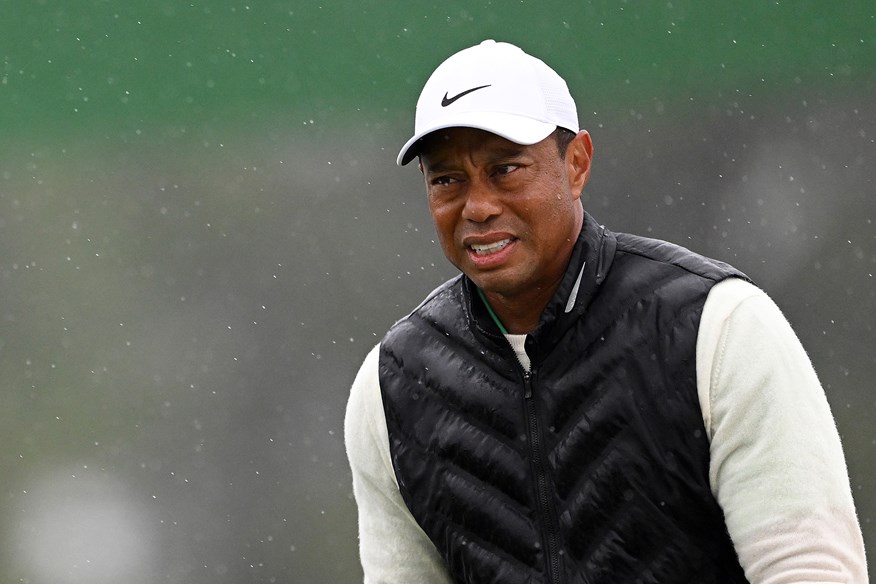
Finally, Alan, what’s the next project for you?
Michael Bamberger and I put out a novel in 2013 called The Swinger, which some people think was based on the life and times of Tiger Woods! We’ve talked about a sequel for a long time and I sent him the first chapter the other day. It’s a lot of fun. Unlike this book, there’s no interviews, fact-checking, legal manoeuvring, or back and forth with the publisher. Fiction’s wonderful, you just sit at your desk and make it all up so it’s a nice way to decompress. But then three years ago, all of this would’ve felt like fiction!
LIV And Let Die by Alan Shipnuck, published by Simon & Schuster, is out now, priced at RRP £25.
Read an exclusive extract from the book, in which Shipnuck explains why LIV Golf players don’t appear on the Golf Channel and why Patrick Reed only started filing lawsuits once he’d left the PGA Tour.
-
 Was Tiger Woods' near-fatal crash an accident?
Was Tiger Woods' near-fatal crash an accident?
-
 Brooks Koepka won the 2023 PGA Championship
Brooks Koepka won the 2023 PGA Championship
-
 Bryson DeChambeau has rediscovered his form since joining LIV
Bryson DeChambeau has rediscovered his form since joining LIV
-
 Has Chesson Hadley overvalued himself due to the increased money in golf?
Has Chesson Hadley overvalued himself due to the increased money in golf?
-
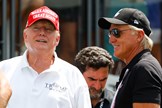 Is LIV Golf trying to cut ties with polarizing figure Donald Trump?
Is LIV Golf trying to cut ties with polarizing figure Donald Trump?
-
 Greg Norman's ties to LIV Golf are getting weaker and weaker
Greg Norman's ties to LIV Golf are getting weaker and weaker
-
 Justin Thomas has been known to drop a swear-bomb on the golf course.
Justin Thomas has been known to drop a swear-bomb on the golf course.
-
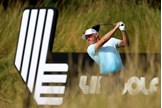 Lee Westwood hasn't set the world alight since joining LIV Golf
Lee Westwood hasn't set the world alight since joining LIV Golf
-
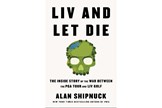 LIV and Let Die by Alan Shipnuck
LIV and Let Die by Alan Shipnuck
-
 Patrick Cantlay was at the centre of a row over players being paid to play at the Ryder Cup
Patrick Cantlay was at the centre of a row over players being paid to play at the Ryder Cup
-
 Phil Mickelson is confident about LIV Golf's future
Phil Mickelson is confident about LIV Golf's future
-
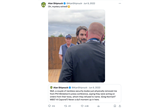 Alan Shipnuck was denied entry to a LIV event while Greg Norman watched on
Alan Shipnuck was denied entry to a LIV event while Greg Norman watched on
-
 Tiger Woods is still affected by injuries sustained in a major car crash
Tiger Woods is still affected by injuries sustained in a major car crash
-
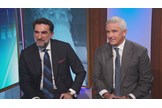 The LIV Golf merger still hangs in the balance
The LIV Golf merger still hangs in the balance
